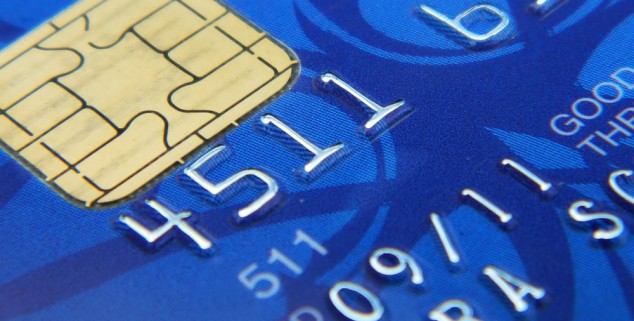Opinion
Old credit card technology is fraud-prone
 A credit card equipped with a chip. (Photo: Petratiu, via Shutterstock)
A credit card equipped with a chip. (Photo: Petratiu, via Shutterstock)Paper currency today is quickly becoming a quaint notion now that we have electronic options to choose from. Consumers are increasingly using credit and debit cards to transact purchases, from lattes to electronics. Unfortunately with that evolution comes financial fraud. As a victim of credit card fraud I can speak firsthand about the ensuing difficulties, even with financial institutions willing to help.
Currently, the United States is the only major economic power in the world that still uses outdated magnetic stripe cards coupled with a faulty signature verification process. Magnetic stripe and sign cards have resulted in billions of dollars in fraud related losses each year. While it is a common inclination of consumers to blame the businesses where the fraud is committed, credit card companies that have deployed vulnerable payment methods for decades, easily outmatched by sophisticated criminals, are culpable too.
Credit card issuers have started sending out new credit cards with an embedded microchip.
Outdated credit card technology threatens the economic well being of all Americans, especially minority consumers because financial fraud can have damaging consequences on a working family’s budget. This is especially true for Latino households and consumers. As the fastest growing consumer block in California, Latinos’ spending power exceeds $1.5 trillion annually, according to recent reports. Nationally, more than 14 million Latinos own credit cards, accounting for more than 10% of all consumers who have or use them.
Magnetic stripe cards are easy to replicate and signatures often over looked or easily forged. The more secure chip and PIN technology would dramatically reduce credit fraud and protect consumers’ most valuable financial information. Unfortunately, credit card issuers continue to stall on the implementation of chip and PIN technology as they proceed to narrowly focus on the short-term costs associated with changing out existing technology.
In order to move past fraud-prone magnetic stripe cards, credit card issuers have started sending out new credit cards with an embedded microchip. The microchip is encrypted and prevents our card from being counterfeited using stolen financial data. While a step in the right direction, these newer chip-equipped cards still rely on exceedingly fallible signatures as a secondary means of verifying a transaction is legitimate. Instead of signature verification, card issuers should be implementing chip-equipped cards that require consumers to enter a personal identification number (PIN) – the chip and PIN method.
Countries that have already implemented chip and PIN technology have been successful and seen a sharp reduction in fraudulent charges. Last year, President Obama issued an executive order mandating all federally issued credit cards be equipped with chip and PIN technology and that all point-of-sale terminals in federal buildings be upgraded to accept them. This action is a strong signal from the Administration that chip and PIN is the best technology available to protect consumers.
California can also lead by example when it comes to protecting consumers and businesses from credit card data breaches. Governor Jerry Brown should seriously consider an executive order, similar to President Obama’s, mandating that all state credit card transactions utilize chip and PIN technology. Mandating chip and PIN technology for state cards, like the ones in the Cal-Card Program, would protect consumers while at the same time protecting state finances. Last week, the Latino Consumer Federation joined with the California Retailers Association and the California Grocers Association in urging Governor Brown to consider this route. If one of the country’s most populous states – home to the largest Hispanic population in the country – moves toward chip and PIN, it will continue to build pressure on the credit card industry to implement chip and PIN technology for all Americans.
In the fast paced world we live in, where technology is ever evolving, California consumers should expect nothing less when it comes to protecting their financial well-being.
—
Ed’s Note: Michael Bustamante is founder and board chair of the Latino Consumer Federation, a non-profit education and advocacy organization dedicated to the advancement and empowerment of the Latino community and its growing consumer base.
Want to see more stories like this? Sign up for The Roundup, the free daily newsletter about California politics from the editors of Capitol Weekly. Stay up to date on the news you need to know.
Sign up below, then look for a confirmation email in your inbox.

Leave a Reply